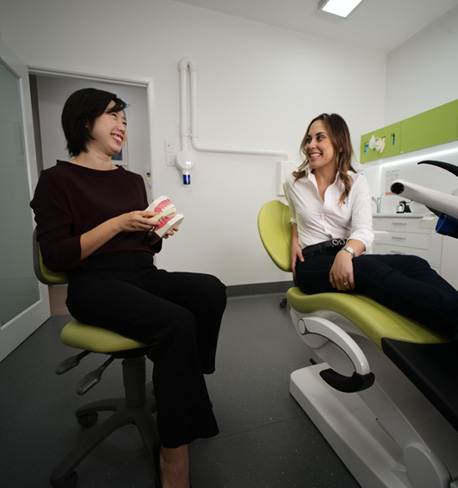
Periodontitis
Book a check-up- Home
- Treatments
- Restorative Dentistry
- Periodontitis
Periodontitis
Periodontitis West End
MANY PEOPLE ARE AFFECTED BY PERIODONTITIS AT SOME TIME IN THEIR LIFE
Did you know that periodontitis is the most common cause of teeth loss in adults? As plaque builds up on teeth, this can lead to early stages of gum disease, leading to periodontitis.
What is Periodontitis?
Gum disease (Periodontitis) is a set of inflammatory diseases affecting the tissues that support and surround the teeth. In the early stages it is known as gingivitis. It is caused by a bacterial infection or poor oral hygiene which causes gums to inflame. Periodontitis involves progressive loss of bone around the teeth and will lead to loosening and subsequent loss of teeth if left untreated.
Periodontitis has been linked to an increased risk of stroke, myocardial infarction (heart attack), atherosclerosis (plaque build-up on the arteries) and diabetic condition.
How do I know if I have Periodontitis?
If you feel like you may be experiencing symptoms of periodontitis (as described below) it is advised to come and see us. We are able to examine you and will be able to note any inflammation.
A diagnosis can be made by using a probe to check for any pockets around the teeth. You may be asked about your medical history or lifestyle habits to see if there are any links to gum disease. An x-ray may be needed to see if there is any loss in the bones.
What are the symptoms of Periodontitis?
In the early stages, periodontitis shows very few symptoms this is why the disease has progressed significantly in many patients before they seek treatment. Symptoms may include:
- Bleeding gums when you brush or floss teeth
- Recurring red/swollen gums
- Bad breath (Halitosis)
- Receding gum
- Loose teeth or the feeling of movement
- Pain and sensitivity when chewing
What can I do to prevent Periodontitis?
- Brushing at least twice day. From the day we get our first tooth, we need to brush our teeth on a regular basis. Particles that build up from food throughout the day needs to be removed to stop the build-up of plaque.
- Flossing daily. Like brushing you can prevent a lot of problems that occur with teeth by flossing regularly. Using mouthwash is also a good addition to your oral hygiene routine.
- Regularly visiting the dentist. Seeing the dentist regularly means they can monitor your oral hygiene and advise if it needs more attention. It means they can identify any early signs of periodontitis before it gets severe.
- Changing your lifestyle habits, such as smoking, as this can contribute to gum disease.
What is the process to manage Periodontitis?
With regular trips to the dentist, they can notice any early signs which makes it easier to manage. The main aim is to take control of the infection and make sure you understand the care needed to be taken at home.
A probe is used to measure the space between the tooth and gum and determine the health. It is important to remove all the plaque and calculus to retain a high level or oral health. This is usually done with a procedure called scaling or debridement. This procedure may require multiple visits depending on the situation and may be carried out using local anaesthesia.
You will be given instructions and advice of how to look after your teeth at home. This must be followed to keep control of the disease.
Your dentist will be happy to talk through periodontitis more with you if you feel you need more information.
Periodontitis Brisbane
At My Dental Care @ West End, we provide a wide range of restorative dental services. Whether you’re looking to have Invisalign, dental implants or anything in between – we’re happy to assist you in any way we can!
Contact us today and take that step towards improving your smile and overall oral health.
Frequently asked Questions
What is Periodontitis?
Periodontitis is a severe gum infection that damages the soft tissue and bone supporting your teeth. This condition can often be subtle, as its symptoms may not become apparent until it has progressed substantially. Regular dental check-ups and x-rays are the most effective methods for early diagnosis, ensuring its detection before it reaches more advanced stages. Caused by untreated gingivitis, periodontitis can lead to tooth loss if not treated in time. Symptoms include swollen, bleeding gums, loose teeth, and bad breath. Maintaining good oral hygiene and frequent dental visits are essential for prevention. Treatment typically involves deep cleaning and, in more severe cases, surgery.
What are the effects of periodontal disease on systemic health?
Periodontal disease can affect systemic health by potentially increasing the risk of heart disease, stroke, diabetes complications, respiratory issues, pregnancy complications, and may have links to arthritis and cognitive decline. Regular dental care is essential to minimise these risks.
If you have periodontal disease, will you need to visit a dentist?
Yes, if you have periodontal disease, regular visits to the dentist are essential for evaluation, treatment, and ongoing management to prevent complications and maintain oral health.

Get in Touch with My Dental Care West End
If you have any questions or concerns, contact the friendly team at My Dental Care @ West End today!





